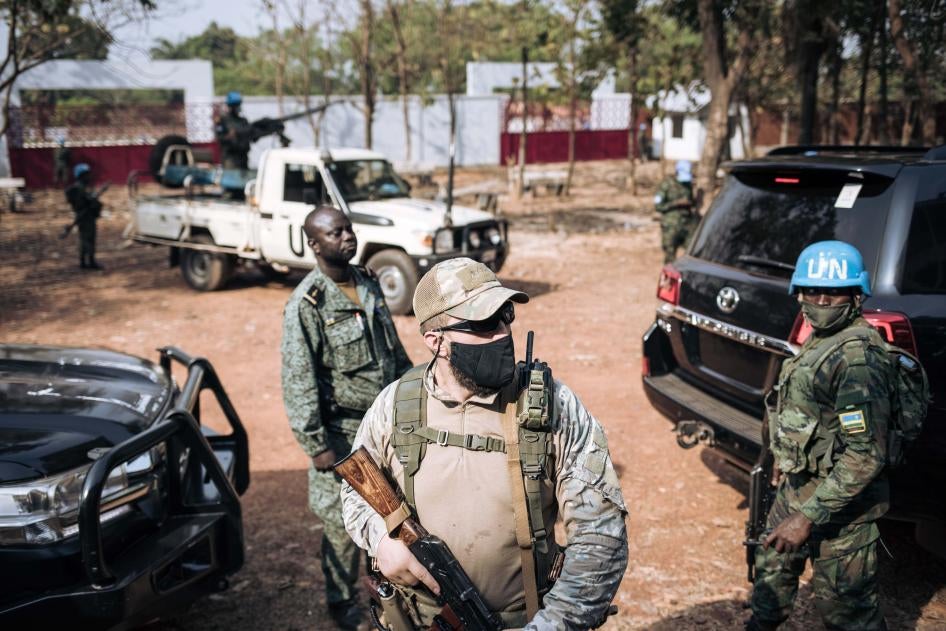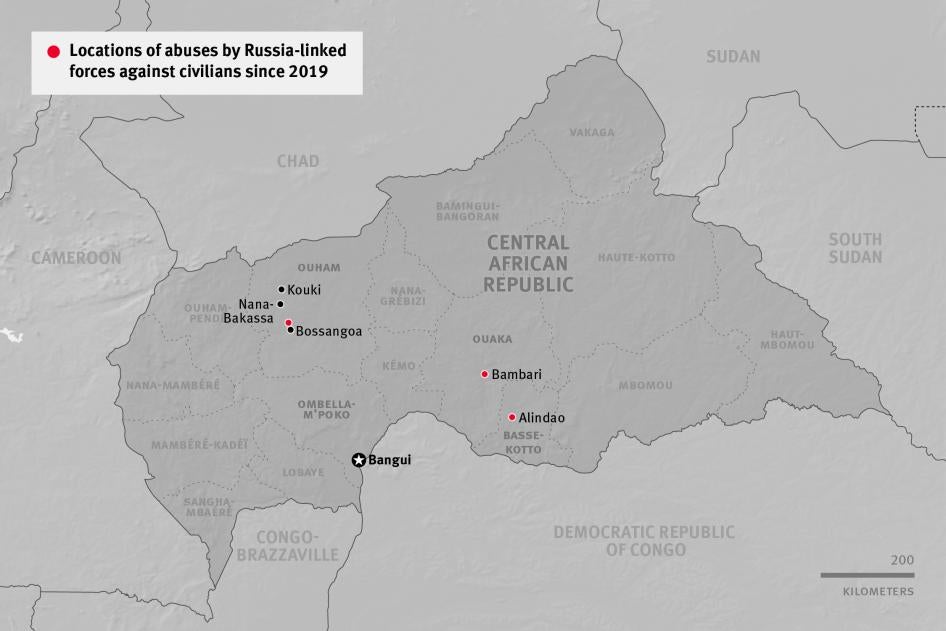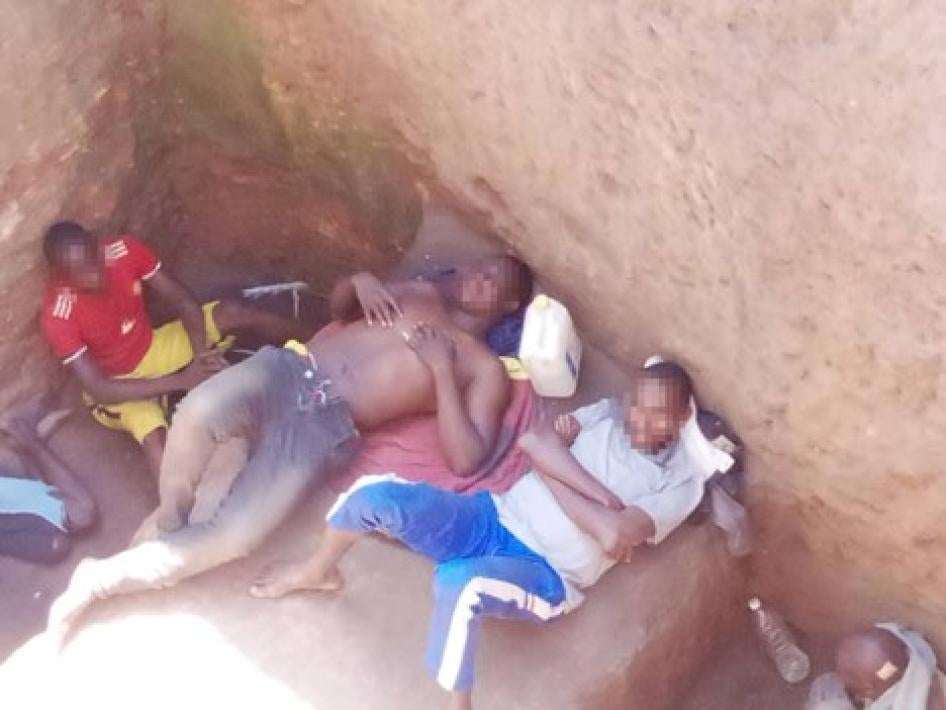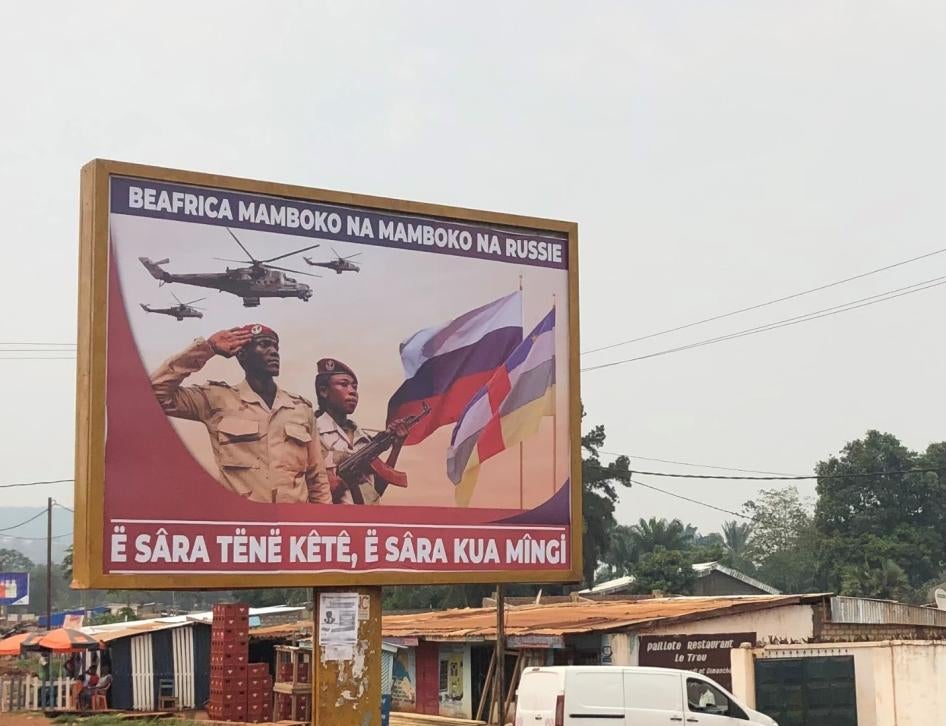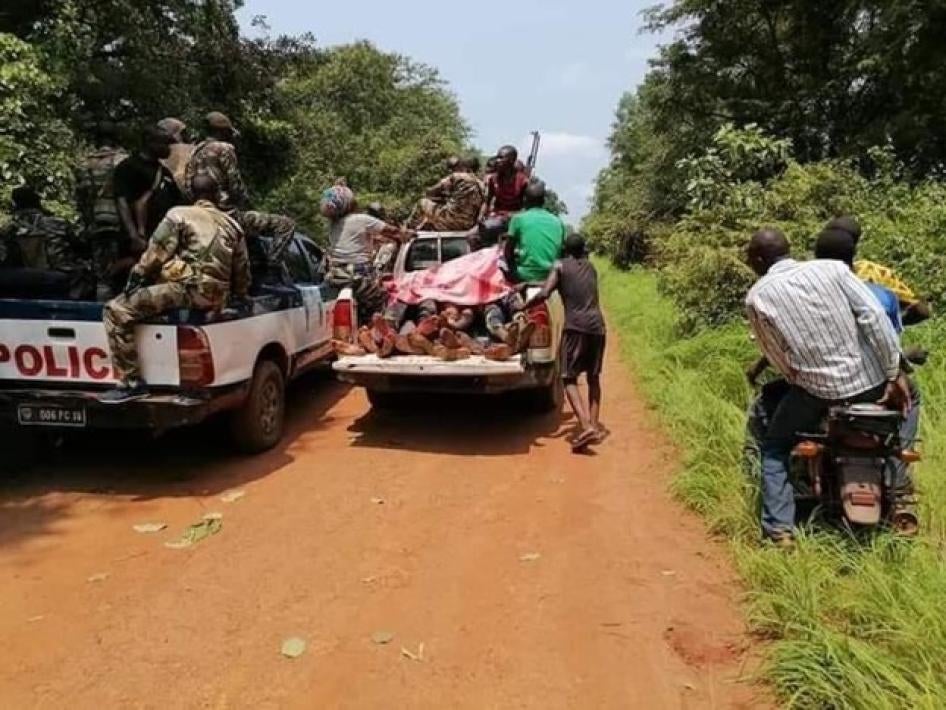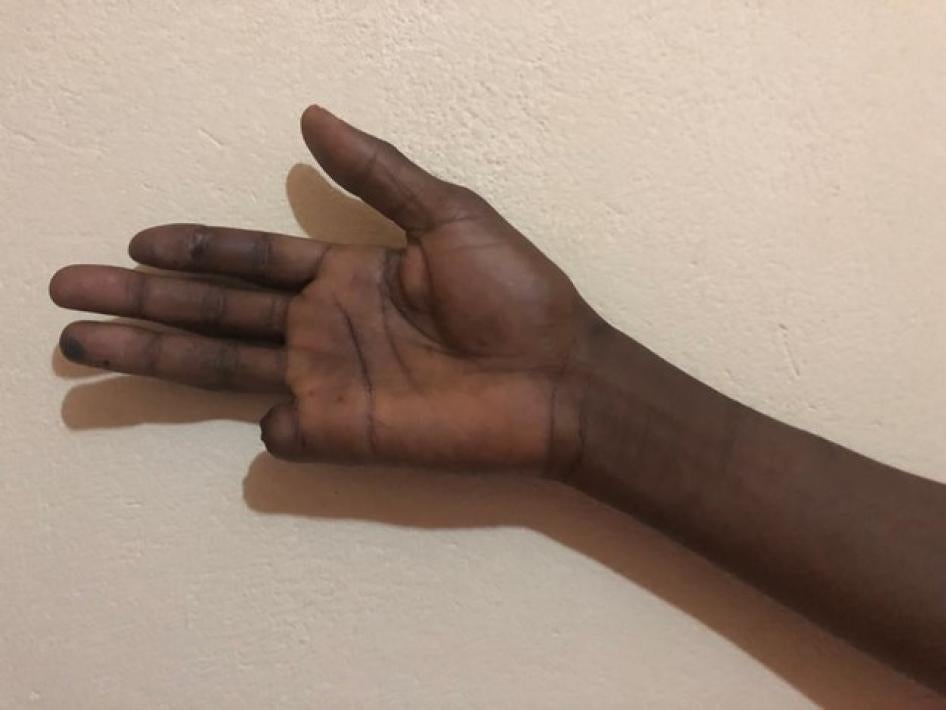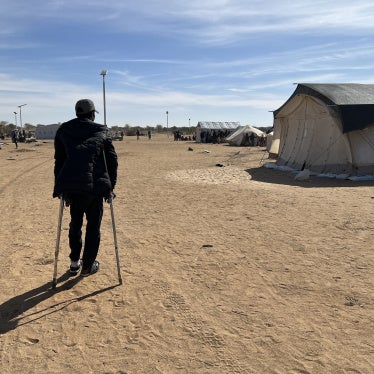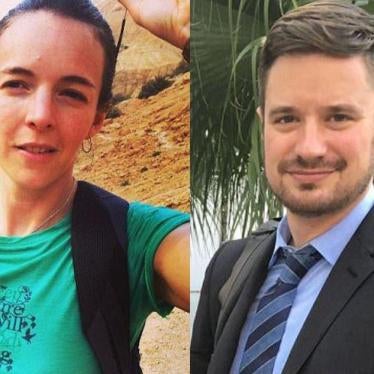(Nairobi) – Forces in the Central African Republic, whom witnesses identified as Russian, appear to have summarily executed, tortured, and beaten civilians since 2019, Human Rights Watch said today. National authorities, the country’s Special Criminal Court (SCC), or the International Criminal Court (ICC), should investigate these incidents as well as other credible allegations of abuse by Russia-linked forces with a view to criminal prosecution.
Several Western governments, and United Nations experts and special rapporteurs have found evidence that the forces linked to Russia operating in the Central African Republic include a significant number of members of the Wagner Group, a Russian private military security contractor with apparent links to the Russian government. On April 15, the United Nations announced it would investigate the circumstances in which at least 10 people were killed in the northeast, with some initial reports alleging Russian forces may have been involved.
“There is compelling evidence that Russian-identified forces supporting the Central African Republic’s government have committed grave abuses against civilians with complete impunity,” said Ida Sawyer, crisis and conflict director at Human Rights Watch. “The failure of the Central African Republic government and its partners to forcefully denounce these abuses, and to identify and prosecute those responsible, will most likely only fuel further crimes in Africa and beyond.”
Between February 2019 and November 2021, Human Rights Watch interviewed 21 people in person and 19 others by phone, including 10 victims and 15 witnesses, about abuses they said were committed by men with white skin speaking Russian, a language the witnesses recognized. Witnesses said that the men were carrying military-grade weapons and wearing beige khaki clothes, scarves to cover their faces, military boots, gloves, and sunglasses.
In August 2018 the Central African Republic and Russian authorities signed an agreement under which “primarily former military officers” from Russia, also called “specialists”, would train Central African Republic forces. Russia-linked forces in the Central African Republic do not wear a designated uniform with official insignia or other distinguishing features.
Twelve people spoke about an incident on the morning of July 21, 2021, in which apparent Russian-speaking forces killed at least 12 unarmed men near the town of Bossangoa. Human Rights Watch obtained the names of those killed from the United Nations and others who knew the victims. Bossangoa officials said the Central African authorities concluded that 13 people were killed in the attack.
Witnesses said that men speaking Russian set up a roadblock, stopped the men, beat, and shot them dead, and then put at least eight of the bodies in a shallow hole next to the road.
On August 2 the government said that it would set up a special commission of inquiry to establish responsibility and take appropriate measures. On October 27, in a joint statement, 16 UN Working Group experts and special rapporteurs referred to the special commission finding earlier that month that “Russian instructors” had committed human rights and laws of war violations. However, the commission has not published its findings.
Human Rights Watch also spoke with six men who said that Central African army forces accused them and fifteen other men of being rebels and unlawfully detained them for several days or weeks between June and August 2021 in inhuman conditions in an open hole at a national army base in Alindao, in Basse Kotto province, in the south. They said both national army and Russian-speaking forces beat five of the men and that both forces may have executed two who were rebel combatants. Human Rights Watch was unable to independently verify the allegations of extrajudicial executions.
Human Rights Watch also documented cases of detention and torture by Russia-linked forces in Bambari in 2019.
The UN says the first training conducted by “Russian instructors” of Central African forces concluded on March 31, 2018, since when Russia-linked forces have remained in the country. Reports of abuse by these forces first surfaced in media reports in February 2019, and the UN later reported on abuses by these forces in 2020 and 2021. In July 2018 three Russian journalists making a documentary in the country on the presence of the Wagner Group were murdered, but their killers have not been found.
Former Prime Minister Henri-Marie Dondra, who stepped down in early February 2022, has said that “there is no contract” between his country and “a Russian private security company.… only a military cooperation agreement with Russia.” The current Russian security adviser to President Faustin-Archange Touadéra also told Human Rights Watch in November that Russia-linked forces in the Central African Republic had no connection to the Wagner Group. On May 1, Russian foreign minister Sergei Lavrov in an interview with an Italian news channel acknowledged that the Wagner Group “provides security services” to the Malian government and that “this private military company has [also] been invited by the Libyan authorities on a commercial basis, like in Mali.”
However, the European Union, France, and the United States, as well as the UN Panel of Experts on the Central African Republic, and UN Working Group experts and special rapporteurs have all reported that the Wagner Group is operating in the country.
The EU has concluded that its personnel are an integral part of the Russian authorities’ presence in the country, saying that as of late November 2021, “most” Central African Republic army units were “operating under [the] direct command or supervision [of] Wagner Group mercenaries.”
The US Treasury Department describes the Wagner Group as a “Russian Ministry of Defense proxy force” which it says is “believed to be manage[d] and financ[ed]” by a Russian oligarch reportedly close to Russian President Vladimir Putin. The Treasury Department has imposed sanctions on eight “entities and individuals” it says are working to advance Russia’s influence in the Central African Republic.
The EU has also sanctioned a number of other individuals involved in the Wagner Group’s activities, including in current operations in the Central African Republic, Libya, and Syria. Media organizations have also reported that the Group is active in Mali, and in the current fighting in Ukraine, for which the UK has also sanctioned the group. In February 2022 the African Union’s Commissioner for Political Affairs, Peace and Security said he wanted to "completely exclude mercenaries from our continent".
On April 26, Human Rights Watch wrote to the Central African government and to the Russian foreign minister to present its findings and request information relating to any status of forces agreement between Russia and the Central African Republic and to the presence of Wagner operatives in the country. Human Rights Watch also asked the Central African government about the special commission’s findings. There has been no reply.
National judicial authorities, the country’s Special Criminal Court, a hybrid war crimes court based in Bangui, and the ICC all have jurisdiction over serious crimes committed in the country. Credible allegations of abuse, including potential war crimes, by Russia-linked forces or private security personnel in the country should be investigated and prosecuted, Human Rights Watch said. Russia should fully cooperate with such an investigation.
“The Central African government has every right to request international security assistance, but it can’t allow foreign forces to kill and otherwise abuse civilians with impunity,” Sawyer said. “To demonstrate its respect for the rule of law, and to put an end to these abuses, the government should immediately investigate and prosecute all forces, including Russia-linked forces, responsible for murder, unlawful detention, and torture.”
For more information on Russian abuses in the Central African Republic, please see below.
Central African Republic in Crisis
The Central African Republic has been in crisis since late 2012, when mostly Muslim Seleka rebels began a military campaign against the government of former President François Bozizé. The Seleka took control of the country’s capital, Bangui, in March 2013. Their rule was marked by widespread human rights abuses, including the wanton killing of civilians.
In mid-2013 Christian and animist anti-balaka militias organized to fight the Seleka. Associating Muslims with the Seleka, the anti-balaka carried out large-scale reprisal attacks against Muslim civilians in Bangui and western parts of the country. African Union (AU) and French forces pushed the Seleka rebels out of Bangui in early 2014 and a United Nations Peacekeeping mission, known by its French acronym, MINUSCA, took over from the AU mission in September 2014. Violence and attacks against civilians have continued as the Seleka broke into factions that still control large swathes of the country.
Russian Intervention
The nature and role of Russia-linked forces in the Central African Republic is murky. According to five UN experts, including from the Working Group on the Use of Mercenaries, the Central African Republic and Russian defense ministries signed a bilateral agreement on military cooperation on August 21, 2018. A Russian security adviser to the Central African Republic’s president told Human Rights Watch researchers in Bangui in November 2021 that the agreement allows for “no more than 1,135 Russian instructors” to be deployed in the country at any one time.
In a June 25, 2021 letter to the UN Security Council, the UN Panel of Experts on the Central African Republic wrote that Russia had said the “instructors … were primarily former military officers … recruited by the Russian Ministry of Defense,” who “did not take part in military operations.” On November 19 the Russian security adviser told Human Rights Watch that Russian instructors “only fight if they or national army soldiers with whom they were deployed are attacked”.
The UN Panel of Experts, however, said in the June letter that it had “collected testimonies from a large number of” sources “who noted the active participation of Russian instructors in combat operations on the ground.” A separate group of 16 UN experts, including from the UN Working Group on the Use of Mercenaries, said in March 2021 that they were “disturbed to learn of the proximity and interoperability between [Russian] contractors and MINUSCA,” including “medical evacuations of wounded ‘Russian trainers’ to MINUSCA bases.”
There is also evidence that Russia-linked forces in the Central African Republic include a significant number of individuals from the Wagner Group and that they regularly engage in active combat.
In September 2021 eight UN experts, including the rapporteur of the Working Group on the Use of Mercenaries, said that since 2018 “there appears to [have] be[en] an increasing presence of private military and security contractors with ties to … Russia … often referred to generically as the Wagner Group … in the Central African Republic” who were “deployed to almost all front lines” after December 2020.
On November 12, 2021, French officials told the UN Security Council that “Wagner’s presence in the Central African Republic is deeply destabilizing.” Previously, in January 2019, the French foreign minister, Jean-Yves le Drian, had said that Russia-linked forces in the country were made up “in large part by Wagner” forces. Valery Zakharov, the Russian security adviser to President Touadéra at the time, denied that the Wagner Group operated in the country.
A leaked November 2021 European Union (EU) External Action Service report on the Central African Republic, published in the media, stated that “today, most [national army] units are operating under direct command or supervision by WG [Wagner Group] mercenaries.” In December the EU suspended its training of national army soldiers as a result of their links to the Wagner Group, and said it wouldn’t resume until the EU has “assurances that the soldiers will not be used by the Wagner mercenaries.”
On December 13 the EU Council of Ministers also imposed restrictive measures, including travel bans and asset freezes, on “the Wagner Group” and on eight individuals and three “entities connected to it” for abuses in a number of countries, including the Central African Republic.
In October 2021 the Central African Republic’s prime minister at the time, Henri-Marie Dondra, said that “there is no contract” between his country and “a Russian private security company.… only a military cooperation agreement with Russia [involving] instructors who help train our security and defense forces.”
The current Russian security adviser to President Touadéra also told Human Rights Watch in November that Russia-linked forces in the Central African Republic had no connection to the Wagner Group, and that the idea of “Wagner’s presence” in the country was “an invention by the French and the media.” He said that “all the “instructors” in the country were former Russian military staff who all came to the country on Russian military aircraft.
Summary Executions Near Bossangoa, July 21, 2021
Bossangoa is a town of approximately 35,000 people in Ouham, the home province of former President Bozizé and a large number of anti-balaka fighters.
Human Rights Watch interviewed 12 people, 10 by phone and 2 in person, about an ambush that involved armed Russian-speaking men in uniform who beat and summarily executed at least 12 unarmed men on the morning of July 21, 2021, on the road between the towns of Bossangoa and Nana-Bakassa in the Nana-Bakassa sub-prefecture of Ouham province. All 12 asked to remain anonymous for fear of retaliation.
Human Rights Watch obtained the names of 12 people killed, including 8 identified by MINUSCA staff, of whom 6 were also mentioned by others who knew them. UN staff said they were aware that more than eight people had been killed but could only identify eight. Two people told Human Rights Watch that at least three of the victims were traders who were traveling to a large regional market in Kouki, a town between Nana-Bakassa and Batangafo.
The prefect of Bossangoa, a local administrative official, admitted to Human Rights Watch that the people were killed, but blamed rebel forces. He also said the authorities in Bangui had identified 13 victims, but had not shared any names with the authorities in Bossangoa.
Everyone interviewed said that the killings happened between 6 and 7 a.m. about 12 kilometers north of Bossangoa, near the villages of Gazum and Nossi.
One person said that a group of 19 young men on six motorbikes left Bossangoa shortly after 6 a.m. Based on other interviews, Human Rights Watch found that the attackers stopped only three or four of these bikes. The two or three other bikes either successfully passed through the roadblock or turned around when they saw the roadblock and returned to Bossangoa.
Three people interviewed said that the group of motorbikes was initially stopped at a permanent Central African military checkpoint at the northern exit of Bossangoa and that the riders were told they could proceed on the road to Kouki.
One person said that at some point between 6 and 7 a.m., he saw a number of military vehicles pass the location of the attack, including a pickup land cruiser, a national army land cruiser, and a gendarme [police] pickup truck. Shortly thereafter, he said, he saw four motorcycles driven by white men pass the same spot. The prefect of Bossangoa said that Russia-linked forces often patrolled on the road and had been on patrol there that morning with local gendarmes. Another person said that Russians based in Bossangoa had regularly patrolled the road on motorbikes or trucks in the previous months.
Based on its interviews, Human Rights Watch concluded that between four and six men blocked the road about 12 kilometers north of Bossangoa. They were standing next to four motorbikes, spoke Russian, and wore beige khaki clothes, scarves to cover their faces, military boots, gloves, and sunglasses. Their white arms and partly exposed faces were visible, and they pointed military-grade weapons at the approaching motorbikes, signaling with their hands to stop, which the group did a few meters short of the roadblock.
The Russian-speaking men gestured to the group to get off the motorbikes and put their hands on their heads. They shouted “photo, photo” which the group understood to mean phones, which the armed men then confiscated, together with their money. They then checked the men’s bags.
The Russian-speaking men then encircled the group and beat and kicked them while they were lying on the ground. Two of the armed men then pulled up members of the group one by one, forced them to kneel, and shot them in the head. Those watching others being killed started to pray out loud. As a result of a distraction, two managed to escape.
Three people told Human Rights Watch that they saw the aftermath of the attack. Two said they saw 11 bodies, including eight or nine in a shallow pit on the side of the road, and two or three nearby. The other person said that all the victims had been shot in the head. Human Rights Watch reviewed four photos said to have been taken after the killings. One shows at least seven bodies piled on top of one another on the side of the road, with some showing signs of having been shot in the head and the others not clearly showing signs of having been shot. Two photos show eight corpses in a vehicle.
The Bossangoa prefect said that the authorities recovered 13 bodies. The prefect said that relatives recovered three bodies directly from the scene, while the authorities took the remaining 10 to the Bossangoa hospital, where relatives picked them up before doctors could examine them.
Two people said that, a few hours after the attack, they saw various official vehicles at the scene, including some belonging to the police, gendarmes, MINUSCA, United Nations Police (UNPOL), as well as the prefect. One person said they saw MINUSCA soldiers pick up bullet casings near the bodies.
The Bossangoa prefect said that survivors of the attack told the authorities that the attackers were fighters from the Coalition of Patriots for Change (Coalition des Patriotes pour le Changement, CPC), a coalition made up of Seleka groups and anti-balaka. However, two witnesses told Human Rights Watch that, shortly after the attack, they went to the prefect’s office in Bossangoa and told him that the Russians had carried out the attack. Two residents also said that they went to the prefect’s office shortly after the attack and heard others with close knowledge of the incident say the same. Another resident said that a person with close knowledge of the incident told the prefect at one of the victims’ funerals in Bossangoa that four Russian-speaking men had carried out the attack.
The prefect said that there had been no attacks by rebels on the road between Bossangoa and Nana-Bakassa in the weeks before the attack. A UN official also said that there had not been any recent rebel attacks, and that Russia-linked forces and the national army were patrolling the road at the time of the attack. Two other local residents said there had been no attacks or other forms of insecurity in Bossangoa or in the surrounding areas in the weeks before the attack.
The prefect said that the authorities in Bangui sent an investigative team a few days after the attack, which had “drawn its own conclusions” and that MINUSCA’s human rights team based in Bangui, and a UNPOL team based in Bossangoa, also visited Bossangoa and the site of the attack.
On September 28 the UN Working Group on the Use of Mercenaries wrote to President, Touadéra, saying that at least 13 people had been “executed near Bongboto, 12 kilometers from Bossangoa,” that those responsible were “military personnel and Russian security” forces, and that witnesses to the executions had been “threatened by Russian personnel.”
Arbitrary Detention, Torture, and Extrajudicial Executions in Alindao, June - August 2021
Between June and August 2021, the national army arrested and detained at least 21 men for between 4 days and a month in inhuman conditions in an open hole at a military base in Alindao, in the eastern Basse Koto province. One resident of Alindao said that a MINUSCA excavator, intended for roadworks in the area, had been used to dig the hole, possibly to bury garbage. Former detainees said the hole was about 5 meters square and 7 meters deep.
Human Rights Watch spoke with six of the former detainees who said that national army soldiers randomly chose them as they were walking in the street and detained them. One person said he thought he was detained because one of his relatives was a former Seleka member.
Four of the six men said that Russian and army forces removed at least two of the other detainees, who were former Seleka combatants, from the hole. They also said they believed the men were later executed. Members of the local community also later told Human Rights Watch that the same two men had later been found dead.
Five of the six men said either Russia-linked forces, or national army soldiers following orders given by Russia-linked forces who were there beat them to obtain information or to force them to falsely admit that they were members of a former Seleka coalition, the Union for Peace in the Central African Republic (Union pour la paix en Centrafrique, UPC).
All six described harsh conditions in the hole. They said their relatives were allowed to leave food for them with the soldiers once a day. Sometimes the soldiers let them leave the hole to use the toilet, but at other times they were forced to defecate or urinate in the hole. There was no cover over the hole and the men were exposed to the elements, including rain.
One former detainee who was accused of being a Seleka said:
“I’m still suffering from head injuries [and] my right hand was hurt by a Russian who struck it hard with his pistol. They made me lie down, and they beat me with cables. I yelled, ‘Even the UPC [the armed group] hurt me! I am not UPC!’ But they did not accept this, and the Russian beat my hand with the pistol. It still hurts.”
Another former detainee said that other detainees would simply make up information to stop the beatings: “Some people were so scared that they just told the Russians about civilians who they said were in the Seleka.”
Another detainee said that the Russians pulled three known Seleka fighters out of the hole in the middle of the night:
“The Russians came with an interpreter. When they arrived, they called those three men out and covered their eyes. All I could hear was ‘Bambari.’ [Bambari is a town 100 kilometers from Alindao.] The next morning, [the detainees’] wives came with breakfast, but they were told the men had been transferred. Then another woman came and said that two of the men’s bodies had been found seven kilometers from Alindao.”
Some men said they heard the national soldiers talk about executions. One former detainee said: “If the men don’t come back, then you know. We also knew, if you are taken out of the hole, then it is over for you.”
Russia Linked Forces Torture Detainees in 2019
Human Rights Watch first documented cases of abuse by Russia-linked forces in 2019.
In February 2019 Human Rights Watch spoke with two men who had been part of a group of 14 men who were arbitrarily detained and tortured by Russia-linked forces in Bambari in January 2019.
The two men’s testimony corresponds broadly with testimony from Alindao in 2021, insofar as the detention and torture focused on getting detainees to confess to being UPC members. However, the abuses in Bambari in 2019 were committed exclusively by Russia-linked forces, with national army forces only translating for them.
One man arbitrarily detained and tortured by Russia-linked forces for four days in January said:
“The Russians stood me up and put my handcuffs behind my back. They slammed my head against the wall very hard… [Another] Russian then started to beat me with a wooden club. He hit me in the stomach, he hit me all over. I don’t know how long he hit me for. After some time, it did not hurt anymore; I had moved beyond pain. I lost consciousness.”
Another former detainee, Mahamat Nour Mamadou, whom the Russians also accused of belonging to the UPC, said that Russian-speaking soldiers beat him in January 2019: “They beat me badly on my legs with iron rods and knives. My ankles were cuffed. One spoke through a translator and said, ‘We will cut off your fingers.’ I said, ‘Just cut my hand off.’”
He said that a Russian-speaking soldier then began slashing his fingers with a knife and eventually cut off a finger, telling him to tell the “truth” about his role with the UPC. “Even the FACA [national soldiers] couldn’t watch,” Nour said. “I was screaming; it hurt so bad. They then took out a chain and wrapped it around my neck and pulled it tight. I fell down, and my tongue rolled out. A Russian put a brick in my mouth and kicked it. It loosened my tooth.”
An AFP article dated February 13, 2019, cited Nour’s identity and used his description of the torture he endured, including how his finger was cut off.
Both Nour and the other person interviewed said they were part of a larger group of 14 who were transferred by the Russians to Bangui, and then released by the Central African police. A member of parliament and an authority in the judiciary confirmed this information in 2019 and said the issue was “too sensitive” to investigate.
In March 2019 Nour informed Human Rights Watch that he was concerned with the attention his case had received and that he was returning to Bambari, where he ran a shop. Human Rights Watch spoke with Nour again in July 2019. At the time, he said he feared for his safety and lived in constant terror. “Every day I see the men who tortured me drive past,” he said. He said that people in Bambari were talking about the AFP story and that he was easily identified because of his missing finger.
Local sources said that on September 29, 2019, two Central African men walked up to Nour’s shop and demanded free cigarettes. When Nour refused, one man pulled out a gun and shot him dead. Nour is one of a few people who has gone public with allegations of torture against Russia-linked forces, and the only one to reveal his identity. In 2019 Human Rights Watch was told that a case was opened into his death, but there has been no progress.
UN Reporting on Alleged Abuses by Russia Forces Linked to Russia
In March 2021 members of the UN Panel of Experts on the Central African Republic wrote to President Touadéra, alleging the involvement of “Russian private military and security personnel” in human rights abuses including extrajudicial killings, enforced disappearances, and torture, and citing a number of examples.
In its June 2021 letter to the UN Security Council, the Panel of Experts wrote that it had “received numerous reports of cases of indiscriminate killings against unarmed civilians by Russian instructors” as well as reports that people had “disappeared without trace after being detained by national security forces and Russian instructors” after December 2020.
In a report covering July 2020 to June 2021, MINUSCA reported that “Russian instructors and employees of private security companies operating in the country either independently or jointly with other state actors” had committed human rights and laws of war abuses. And in October 2021, 17 UN experts said they had received reports of “so-called ‘Russian instructors’ from the Wagner Group … operating as military and security personnel … violently harass[ing] and intimidate[ing]” peacekeepers, journalists, aid workers, and minorities.”
Also in October 2021 a report by the Central African authorities, a summary which has been seen by some media, said “Russian instructors” had committed abuses and some had been repatriated.
Despite these allegations, Central African and Russian authorities have not carried out any independent investigations and there has not been a single prosecution of any Russia-linked forces in the Central African Republic. The Russian security adviser to the country’s president told Human Rights Watch that if there are allegations that “instructors have done something wrong,” a special team of instructors would liaise with the Justice Ministry and the prosecutor to look into such allegations.
He also said that, under the 2018 agreement governing their presence in the Central African Republic, any Russians suspected of wrongdoing would be prosecuted in Russia. This stands in contrast to the statement by the Russian delegation to the UN Security Council on November 12, 2021, which said that “if there have been violations” by Russia-linked forces, “then they should be investigated primarily by the national bodies of the Central African Republic.”
Applicable Law
International humanitarian law regulates the methods and means of armed conflict. A key principle is that all parties to a conflict must distinguish between combatants and civilians, or those no longer taking active part in hostilities. People who commit serious violations of the laws of war with criminal intent – that is, intentionally or recklessly – may be prosecuted for war crimes. Individuals may also be held criminally liable for assisting in, facilitating, aiding, or abetting a war crime.
When governments contract private military and security companies to perform government functions, or when such operators do so with the government’s knowledge and acquiescence, those contractors are the government’s proxies, and it is liable for their actions. Governments, therefore, have an obligation to ensure they respect international humanitarian law and human rights law. They should ensure that any such contractors are appropriately and adequately trained, that there are safeguards in place to prevent them from committing violations, and any alleged abuses are promptly and effectively investigated and appropriately punished. Governments also have an obligation to provide reparations for violations of international humanitarian law and human rights law by such companies’ personnel.
Justice Options
A lack of accountability has fueled many cycles of violence in the Central African Republic. The country’s population has regularly called for justice for serious crimes since national consultations in 2015 known as the Bangui Forum.
The ICC currently has two investigations open concerning crimes in the country, based on requests from the national authorities. The first investigation relates to grave crimes committed in 2002 and 2003, but that investigation has been all but dormant since its only case ended in acquittal on appeal. The second investigation relates to crimes committed since 2012.
In 2015 the Central African Republic established a Special Criminal Court to try serious international crimes committed since January 1, 2003. The court’s mandate is to investigate and prosecute grave violations of human rights and international humanitarian law, including genocide, crimes against humanity, and war crimes. The court has a mandate of five years, which can be renewed only once, for a maximum of 10 years.
The court is integrated into the Central African Republic’s domestic judicial system, but staffed by both international and Central African judges, prosecutors, and administrators, and as such is a “hybrid” court. By delivering justice at a national level and working in parallel to the ICC, the SCC offers a chance to broaden the scope of those held to account for atrocity crimes.
There have also been trials for conflict-related crimes before ordinary courts of the Central African Republic since 2015. In February 2020 the Bangui Court of Appeal sentenced 28 anti-balaka fighters for the killing of 75 civilians and 10 UN peacekeepers around Bangassou in 2017. However, most other proceedings have been against low-ranking people or relate to minor crimes.
Recommendations
The Central African government should publish the findings of the Special Commission it says it has set up to look into the killings in Bossangoa in July 2021. It should also open an independent investigation into all credible allegations of abuse, including potential war crimes, by Russia-linked forces or private military personnel in the country. If needed, it should request support from the SCC, the ICC, or request UN judicial support. It should also invite relevant UN and AU experts to look into abuses by Russia-linked forces and publish the Status of Forces agreement with Russia to clarify what role Russian forces play in the country. It should prosecute any Russia-linked forces suspected to have committed abuses against civilians.
Russian judicial authorities should cooperate with authorities in the Central African Republic to ensure accountability for the crimes Human Rights Watch and others have documented, and prevent further such abuses. They should also ensure that all forces brought from Russia to the Central African Republic under the two countries’ 2018 agreement, or otherwise, are properly vetted and trained to respect international humanitarian law and human rights law, and that they wear official uniforms to enhance accountability should such forces commit serious violations. Where the Russian authorities contract personnel belonging to private military and security companies to work in the Central African Republic, they should follow internationally recognized good practices, including transparent public processes for selecting and contracting such personnel.
